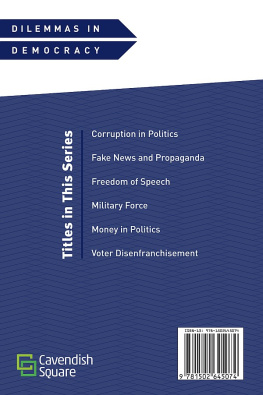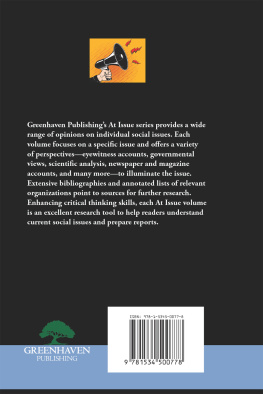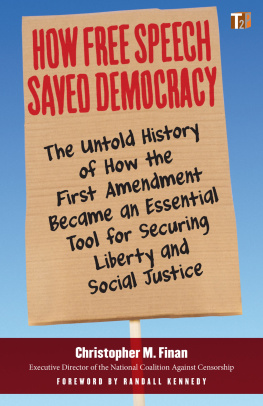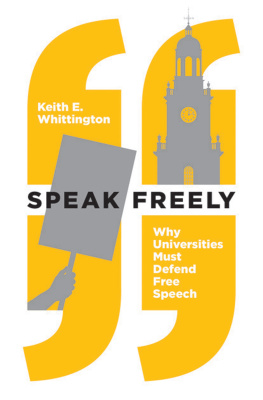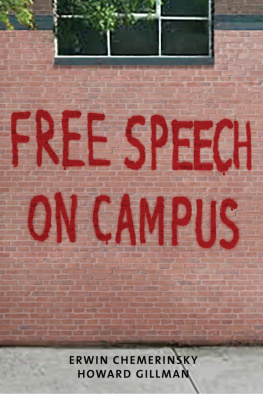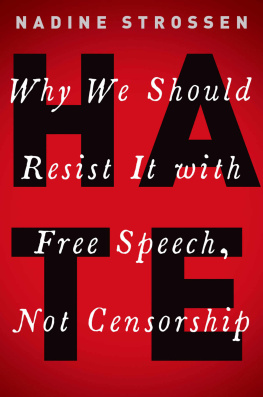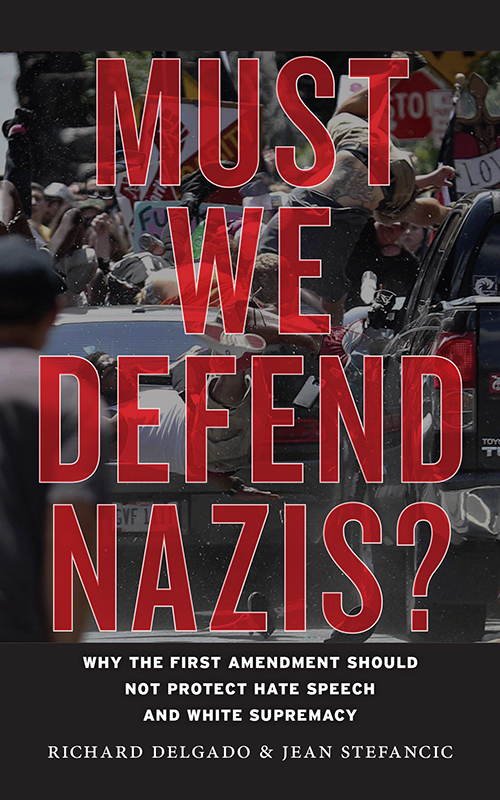
Must We Defend Nazis?
Must We Defend Nazis?
Why the First Amendment Should Not Protect Hate Speech and White Supremacy
Richard Delgado and Jean Stefancic

NEW YORK UNIVERSITY PRESS
New York
NEW YORK UNIVERSITY PRESS
New York
www.nyupress.org
2018 by New York University
All rights reserved
Book designed and typeset by Charles B. Hames
References to Internet websites (URLs) were accurate at the time of writing. Neither the author nor New York University Press is responsible for URLs that may have expired or changed since the manuscript was prepared.
ISBN : 978-1-4798-8771-2 (hardback)
ISBN : 978-1-4798-5783-8 (paperback)
For Library of Congress Cataloging-in-Publication data, please contact the Library of Congress.
New York University Press books are printed on acid-free paper, and their binding materials are chosen for strength and durability. We strive to use environmentally responsible suppliers and materials to the greatest extent possible in publishing our books.
Manufactured in the United States of America
10 9 8 7 6 5 4 3 2 1
Also available as an ebook
Contents
Should Nazis, white supremacists, and Ku Klux Klan members spewing hatred be allowed to march in a peaceful college town like Charlottesville, Virginia? Should city officials give them a permit, and should the local police provide them with protection from indignant protesters?
If trouble erupts, as it easily might in such situations, and the case ends up in court, the ACLU, which champions both the First Amendment and the rights of minoritiesblacks, LGBT people, Latinos, Muslims, and Jewsmight easily find itself called to defend the marchers, as it has done in the past. Is this logically necessary, or wise?
If a neo-Nazi sympathizer who has driven to the rally fueled by hate runs over a crowd of peaceful protesters, killing one and injuring many others, should the president of the United States condemn both sides as equally culpable?
What about members of a fringe religious group who vent their displeasure against homosexuals by staging a noisy demonstration at the funeral of a war veteran? Though they are not injuring anybody or threatening violent harm, they are disturbing the sanctity of the event and the feelings of the bereaved attenders. The authorities might be tempted to ask them to move on. Yet, their demonstration took place on a public street and was an attempt, however misguided, to bring the question of homosexuality to public attention. Must society allow them to do so?
Once again hate speechwords that woundhas vaulted to public attention in a host of settings, including college campuses, demonstrations, the Internet, talk radio, and even presidential addresses and campaign rallies. The First Amendment protects speech as a prime value and considers it a democracy-enhancing instrument and protector of communal decision-making. Yet hateful speech, especially the racial kind, can shock and wound, rending its victims speechless, afraid, and silent, less able to participate in public conversation than they were before being made to suffer it.
Defenders of free-speech rights, such as the ACLU, are fond of saying that we must protect the speech we hate in order to safeguard that which we love. Presumably they mean political speech or words that criticize a public official for his or her performance. But is it really so hard to distinguish between the hateful kind and that which we all desire to protect?
Is this any harder than, for example, figuring out which kinds of associational rights we want to protectthe Girl Scouts meeting to discuss wildlife protection or first aid, certainly, but not criminals or terrorists meeting in secret to plan their next move?
Or put it this way: must the First Amendment be a seamless web, as many seem to think it is? It never has been and it is not now. For decades, courts have held that hate speech on the job can amount to employment discrimination, which is of course illegal. And if you employ too much vituperation on the Internet you may find that your service provider cuts you off, which it is entirely within its province to do. In many court systems, hate speech is a tort for which one can recover damages in a civil lawsuit. And for several years, federal authorities have been punishing hate crime when someone commits an offense, such as assault or arson, with a racial motivationwhich is of course provable only by examining what the accused has said or posted somewhere, perhaps on the Internet.
For many years, courts have been redressing hate speech under a variety of existing causes of action, even if they do not fit exactly. For example, the offending words might have been overheard and so amount to a borderline defamation. A court might easily find that they contain an element of menace or threat, and if so amount to an assault or battery, especially if they accompany light touching, a push, or a shove.
What if they lack any of these, but the victim of those harsh, racially tinged words is a schoolchild and the speaker is a teacher, administrator, or other authority? Once again, courts seem willing to try to find a theory to justify relief, even though no statute or express common-law cause of action commands it.
Other countries go even further, punishing hate speech as a crime, particularly if it targets historically oppressed groups such as Jews or Roma (Gypsies). The sky doesnt fall: indeed many of these countries have a political atmosphere that is freer and more vibrant than ours; citizens there merely cannot engage in vituperation against each other. So why are we so reluctant to follow suit?
If hate speech is not a legal wrong, is it nevertheless immoral, so that we all should condemn it and not make special efforts to defend Nazis, in the words of our title? Perhaps notmaybe abrasive speech is merely part of the ordinary give-and-take of daily life, something we all should get used to and ignore. Or learn to talk back. Or be grateful when it happens because it enables us to know who thinks ill of us and who doesnt. At the time we went to press, the ACLU was struggling with these very questions in connection with white supremacist rallies like the one mentioned above, especially those that include guns.
Defenders of a vigorous system of free speech often encourage the victims of hate speech to get over it. They dismiss their reactions to hate speech as mere offense, as though it were a matter of being called by the wrong name in class or at a work meeting. Indeed, how damaging is hate speech? Does it cause lasting injury, and, if so, of what kind? Who is most vulnerablechildren? Minorities? Workers in an office laced with homophobic or misogynistic remarks and jokes?
This book takes up all these issues. Chapter 1 considers the harms of hate speech. Chapter 2 examines hate speech on university and college campuses. Chapter 3 discusses hate speech in an emerging realmcyberspace. Chapter 4 analyzes arguments against hate-speech regulation that tend to be associated with neoliberals. Chapter 5 takes up a number of arguments made by neoconservatives. Chapter 6 examines the experiences of other Western societies that have enacted anti-hate-speech laws to see what lessons they offer for American institutions. Chapter 7 sets out guides for activist lawyers and judges interested in approaching the hate-speech controversy intelligently. A final chapter discusses the speech we hate.
Next page


